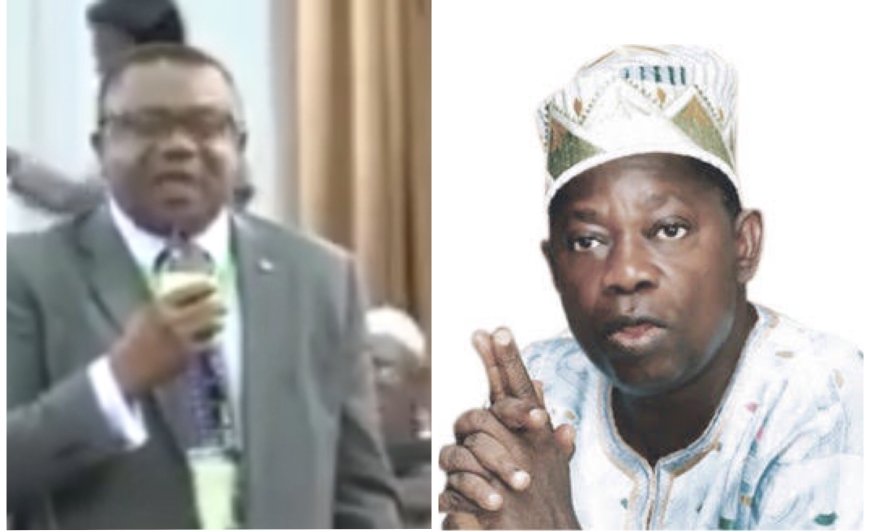Democracy Day In View: How Orok Duke’s Advocacy at 2014 National Conference Laid Foundation for Adoption of June 12

In 2018, Nigeria made a historic shift when President Muhammadu Buhari declared June 12 as the nation’s Democracy Day, replacing May 29, which had been observed since 1999 to mark the return to civilian rule.
This change was more than symbolic; it was a recognition of the pivotal role the June 12, 1993, presidential election played in Nigeria’s democratic struggle.
At the heart of this transition was the advocacy of Rt. Hon. Orok Duke, a delegate from Cross River State at the 2014 National Conference, whose impassioned call for honoring the victims of the June 12 crisis and recognizing Chief Moshood Kashimawo Olawale (MKO) Abiola’s sacrifice helped reignite national discourse on the significance of that date.
Duke’s contributions during the conference were instrumental in laying the groundwork for the eventual adoption of June 12 as Nigeria’s Democracy Day.
The 2014 National Conference, convened by President Goodluck Jonathan, was a platform to address Nigeria’s socio-political and economic challenges through dialogue. With 492 delegates representing diverse groups, the conference aimed to propose solutions to issues like insecurity, corruption, and governance structures.
Orok Duke, a seasoned politician and opinion leader from Cross River State, emerged as a strong advocate for democratic ideals, drawing from his deep-rooted commitment to building an egalitarian society.
His advocacy at the conference was not merely rhetorical but a strategic push to reframe Nigeria’s democratic narrative around the June 12 election, widely regarded as the freest and fairest in the country’s history.
On June 12, 1993, Nigerians voted overwhelmingly for MKO Abiola, a businessman and philanthropist, in an election that transcended ethnic and religious divides. However, the military regime under General Ibrahim Babangida annulled the results, plunging Nigeria into a decade-long crisis marked by civil protests, violence, and the deaths of pro-democracy activists, including Abiola himself in 1998.
Until 2018, Democracy Day was celebrated on May 29, commemorating the 1999 transition to civilian rule under President Olusegun Obasanjo. However, many Nigerians, particularly in the South-West, felt this date overlooked the sacrifices made during the June 12 struggle, which was a broader movement for democratic restoration.
During the 2014 National Conference, Orok Duke seized a critical moment to address this historical oversight. On June 12, 2014, invoking Order 7 Rule 5 under matters of urgent national importance, Duke moved a motion calling for a minute of silence to honor the victims of the June 12 crisis.
He argued that June 12 was a “watershed in the history of Nigeria” and that the conference should recommend a monument to honor Abiola and others who paid the ultimate price for democracy.
Duke’s motion was not just a call for remembrance but a challenge to the delegates to acknowledge June 12 as the true foundation of Nigeria’s democratic journey. He stated, “June 12 is a preamble as to why we are here today. It is a continuation of unfinished business of 1993.”
Duke’s advocacy resonated with key figures at the conference, notably elder statesman Edwin Clark of blessed memory, who reinforced Duke’s position by asserting that June 12, not May 29, should be Democracy Day. Clark criticized the “small-mindedness” of those who prioritized May 29, emphasizing that Abiola’s struggle symbolized the collective fight for democratic governance.
The conference observed a minute of silence, a symbolic gesture that amplified the call for June 12’s recognition. This moment, sparked by Duke’s motion, rekindled national conversations about the annulled election and its significance, setting the stage for future policy changes.
The impact of Duke’s advocacy extended beyond the conference floor. By raising the issue at a nationally televised event, he ensured that the June 12 narrative reached a broader audience, including policymakers and civil society groups. His motion aligned with the conference’s broader goal of addressing historical injustices and fostering national unity through a new constitutional framework.
The 2014 National Conference produced recommendations for electoral reforms, devolution of power, and socio-economic rights, but Duke’s focus on June 12 highlighted the need to anchor Nigeria’s democracy in its most defining struggle. His call for a monument and official recognition of Abiola’s contributions planted a seed that resonated with pro-democracy activists and political leaders.
The eventual adoption of June 12 as Democracy Day in 2018 was a direct outcome of years of advocacy, with Duke’s intervention at the 2014 conference serving as a catalyst. President Buhari’s decision to honor Abiola with a posthumous Grand Commander of the Federal Republic (GCFR) award and declare June 12 as Democracy Day was framed as a rectification of historical wrongs.
Buhari acknowledged the “fierce commitment” of Nigerians who opposed the annulment, a sentiment Duke had articulated four years earlier. The policy shift validated the view that June 12 was the “seed that germinated into the prolonged struggle” for democracy, as Buhari noted in his 2023 Democracy Day address.
Duke’s advocacy was rooted in his broader commitment to social cohesion and justice, evident in his community initiatives like Tinkoriko, a platform to unite youths across divides in Cross River State. His ability to connect local activism with national discourse made his intervention at the conference particularly impactful. By framing June 12 as a unifying moment in Nigeria’s history, Duke challenged the narrative that it was merely a South-Western issue, emphasizing its national significance.
In conclusion, Orok Duke’s advocacy at the 2014 National Conference was a pivotal moment in Nigeria’s journey toward recognizing June 12 as Democracy Day. His motion to honor the victims of the June 12 crisis and recognize MKO Abiola’s sacrifice sparked a renewed focus on the election’s role in shaping Nigeria’s democracy. Supported by influential voices like Edwin Clark, Duke’s intervention laid the intellectual and emotional groundwork for the 2018 policy change. By bridging historical memory with contemporary governance challenges, Duke ensured that the sacrifices of June 12 were not forgotten, cementing his legacy as a key figure in Nigeria’s democratic evolution.













































